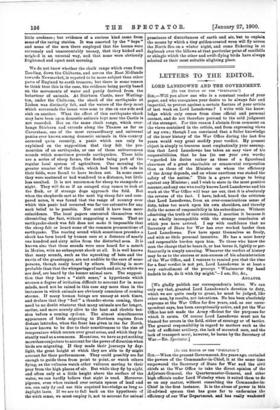LETTERS TO THE EDITOR.
LORD LANSDOWNE AND THE GOVERNMENT.
[To THE EDITOR OF TRH "SPECTATOR.") Sra,—Will you allow one who is a constant reader of your paper, and who recognises your desire to be always fair and impartial, to protest against a certain feature of your article of last week on Lord Lansdowne ? I write with the know- ledge which only comes from close official and personal contact, and do not therefore pretend to the cold judgment of the stranger. For this reason I abstain from comment on the views contained in the article, and from expressing views of my own; though I am convinced that a fuller knowledge of the inner history of the War Office during the last five years would very great modify your verdict. My present object is simply to traverse moat emphatically your assump. tion that Lord Lansdowne has taken an easy view of his responsibilities, that he has (to use your own words) "regarded his duties rather as those of a figurehead chairman of a great charitable or ornamental corporation than as those of the Minister on whom the efficiency of the Army depends, and on whose exertions was staked the safety of the nation." This is a grave charge to bring against any Minister ; and I wish to state in the most positive manner, and any one who really knows Lord Lansdowne and his work at the War Office will bear me out, that it is absolutely the reverse of the fact. I have, indeed, heard the criticism that Lord Lansdowne, from an over-conscientious sense of duty, takes too much upon his own shoulders, and thereby dulls the sense of responsibility in his subordinates. Without admitting the truth of this criticism, I mention it because it is so wholly incompatible with the strange conclusion at which you have arrived. I say with confidence that no Secretary of State for War has ever worked harder than Lord Lansdowne. Few have spent themselves so freely, and with so little personal incentive. He has a most heavy and responsible burden upon him. To those who know the man the charge that he bears it, or has borne it, lightly or per- functorily is simply amazing. Whatever the verdict of history may be as to the success or non-success of his administration of the War Office, and I venture to remind you that the time for a final verdict is not yet, Lord Lansdowne is at least a very embodiment of the precept "Whatsoever thy hand iindeth to do, do it with thy might."—I am, Sir, &c.,
ADLAT178.
[We gladly publish our correspondent's letter. We can only say that, granted Lord Lansdowne's devotion to duty, which we are quite ready to grant, he must be judged, like other men, by results, not intentions. He has been absolutely supreme at the War Office for five years, and, as our corre- spondent says, has been exceptionally active, and yet the War Office has not made the Army efficient for the purposes for which it exists. Of course Lord Lansdowne must not be blamed for errors in the Meld, either of strategy or of tactics. The general responsibility in regard to matters such as the lack of sufficient artillery, the lack of mounted men, and the lack of transport must, however, be borne by the Secretary of War.—En. Spectator.]


















































 Previous page
Previous page